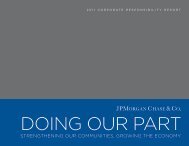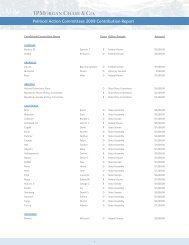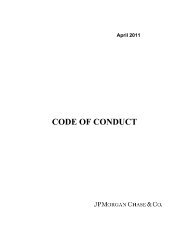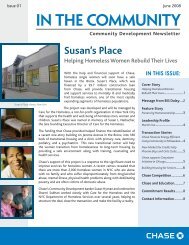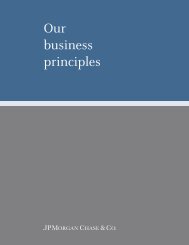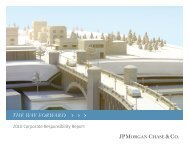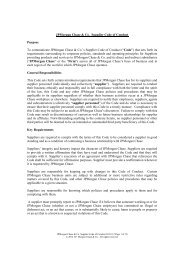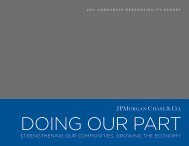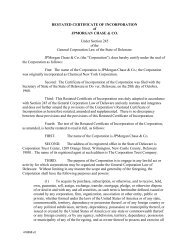2011 Corporate Responsibility Report - JPMorgan Chase
2011 Corporate Responsibility Report - JPMorgan Chase
2011 Corporate Responsibility Report - JPMorgan Chase
Create successful ePaper yourself
Turn your PDF publications into a flip-book with our unique Google optimized e-Paper software.
80<br />
ENGAGEMENT WITH<br />
STAKEHOLDERS<br />
We recognize the importance of<br />
communications with a wide range of<br />
stakeholders, including shareholders,<br />
employees, community groups and<br />
others — both so they understand our<br />
performance and strategy, and so we can<br />
hear their feedback and ideas.<br />
Shareholders<br />
We reach out to shareholders in many<br />
different ways, including quarterly<br />
earnings presentations, SEC filings, web<br />
communication and investor meetings. In<br />
addition, we engage major institutional<br />
shareholders as part of a semiannual<br />
outreach program to invite comments<br />
on governance matters, executive<br />
compensation and shareholder proposals.<br />
We meet throughout the year with<br />
additional shareholders and organizations<br />
interested in our practices.<br />
Employees<br />
Our Open Communication Policy is<br />
based on the premise that open, direct<br />
communication between managers<br />
and employees at <strong>JPMorgan</strong> <strong>Chase</strong> is<br />
essential to a positive and productive<br />
work environment for all, and we give<br />
employees multiple ways to raise issues<br />
or concerns within the organization.<br />
(See also the description of our Code<br />
JPMORGAN CHASE & CO.<br />
of Conduct above.) We maintain a link<br />
on our corporate and line of business<br />
intranet pages where employees can<br />
submit suggestions, and we specifically<br />
encourage ideas for improving our<br />
business processes and workplace<br />
environment. In addition, we recently<br />
launched “What Do You Think?” a survey<br />
tool on our intranet that allows employees<br />
to rate a variety of consumer products<br />
and internal services. We also engage<br />
employees through town hall and small<br />
group meetings, line of business and<br />
corporate blogs, and through INK, our<br />
monthly employee newsletter, which is<br />
made available to all employees globally.<br />
We conduct a firm-wide Employee Opinion<br />
Survey approximately every two years<br />
and are scheduled to conduct one in<br />
May 2012. The Survey is one of the most<br />
important ways for employees to provide<br />
feedback on areas such as leadership and<br />
management, culture, talent management<br />
and mobility, and diversity.<br />
Communities<br />
<strong>JPMorgan</strong> <strong>Chase</strong> has established regional<br />
Community Advisory Boards (CAB)<br />
whose members include community<br />
leaders of not-for-profit organizations<br />
in our major markets. We currently have<br />
more than 110 leaders serving on CABs<br />
in Chicago, Columbus, Delaware, Florida,<br />
Houston, Los Angeles, New York/New<br />
Jersey Metro, Phoenix, San Francisco<br />
and Seattle. These groups meet with<br />
our senior market leadership in each<br />
market twice a year, and we consult<br />
individually with CAB members over the<br />
course of the year as issues arise. CAB<br />
members provide valuable insight on<br />
local community development needs,<br />
offer feedback on local initiatives and<br />
serve as partners in the community. CAB<br />
discussions have also led us to identify<br />
important opportunities to serve our<br />
communities. In <strong>2011</strong>, CAB discussions<br />
focused on community development<br />
lending, investing and philanthropy;<br />
neighborhood stabilization; small business<br />
lending; education as a catalyst for<br />
community development; and the impact<br />
of cutbacks in government funding on<br />
community development.<br />
We also consult regularly with community<br />
stakeholders in cities where we do not have<br />
CABs so that we can hear from them about<br />
the issues in their communities and how we<br />
can better focus our efforts.<br />
In addition, we engage with a number of<br />
community development partners whose<br />
programs and policies are designed to<br />
strengthen low- to moderate-income<br />
communities. Those groups broadly include:<br />
− Community development not-forprofits<br />
and/or coalitions with a focus<br />
on affordable housing, economic



